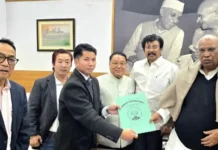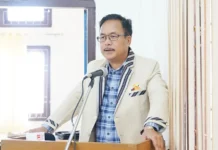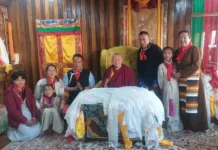RONO HILLS, Jul 30: To commemorate the 150th birth anniversary of Mahatma Gandhi, Rajiv Gandhi University’s (RGU) education department held a lecture series on different aspects of Gandhian ideology related to educational policies and practices.
Prof Jagmohan Singh Rajput spoke on the Covid-19 pandemic, and noted that where there is any form of discussion on peace in the world, “Gandhiji comes to the picture.”
“Gandhi believed that mere knowing of letters and digits is not education. Rather, education is a holistic process of human development which involves harmonious individual development, mainly in the area of 3 Hs: head, hand and heart, meaning cognitive, psychomotor and affective development. He believed that only balanced human beings can contribute to harmonious society, so accordingly education should be organized,” he said.
Prof Rajput, who is the chairman of the governing body of the Mahatma Gandhi Institute of Education for Peace and Sustainable Development, said that “Gandhi always stressed that teachers should be conscious of their duties and responsibilities and continue to practice it, as future generation look at them and replicate.”
RGU Vice Chancellor, Prof Saket Kushwaha dwelt on various facets of Gandhi’s ideas and said everyone needs to “do right, be right, and do justice to each other and everyone, whether you like the person or not.”
He stressed the need to create harmony and work collectively for future development.
RGU Pro-VC, Prof A Mitra characterized Gandhi as a versatile personality and lauded his idea of gram swaraj – a model of improving the economic conditions of Indian villages through spinning and weaving, making them self-reliant.
Profs Kushwaha and Rajput launched the YouTube channel of RGU’s education department.
The channel will host academic programmes in the future, work as a repository of the department’s online activities, and increase the reach of the department among students and academia.
New Delhi-based National Institute of Educational Planning & Administration’s Educational Policy Head, Prof Avinash Kumar Singh stressed on “the importance of pedagogy for teachers as part of Gandhian practice of education,” and on the need for every teacher to be a pedagogue.
“His (Gandhi) ideals on education in the form of basic education or buniyadi siksha were adopted by almost all the commissions of independent India, right from the Kothari Commission, 1966, to the new education policy in the making, but the ideas could not be actualized in education. His idea on education got confined as vocational education, which received secondary treatment in education. It resulted into theoretical education, and therefore our youths lack necessary skills which Gandhi considered an integral part of learning,” Prof Singh said.
On the second day, Prof RP Dwivedi, former chairperson of the Gandhian Studies Centre, MGKVP, Varanasi, said, “Education is a process of socialization, and developing social values among students is the responsibility of education. Education is not development of the mind only but also development of soul.”
In the second lecture of day 2, Dr Noushad PP from Mahatma Gandhi University, Kottamyam, Kerala, explained the “Gandhian vision behind handicraft-based education.” He said that education should be based on social needs. He also explained Gandhi “in the light of Indian policy and practices.”
On the third day, Dr Alok Gardia from the education faculty of BHU, Varanasi, spoke on ‘Lessons from the life of Mahatma and his thoughts on education’.
Dr Anna Nina George of GVM College, Ponda, Goa, spoke on ‘Implementing Gandhian ideology in science popularizing programme among school children’.



